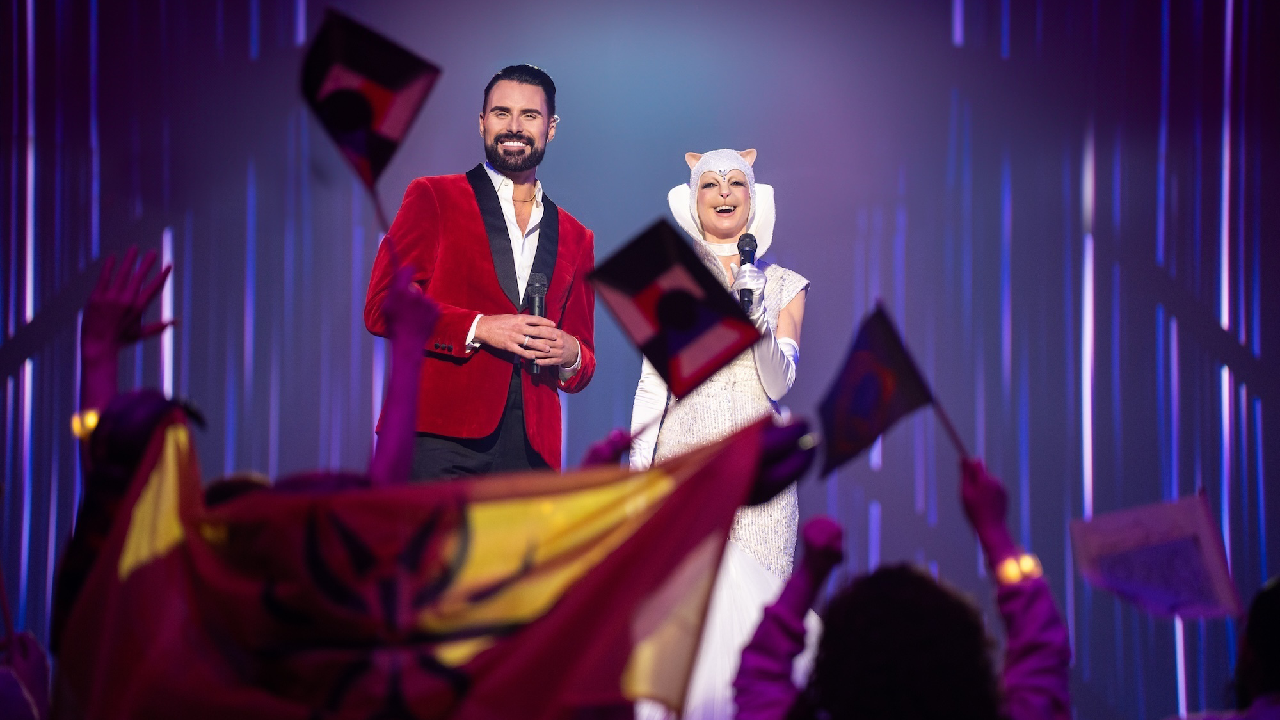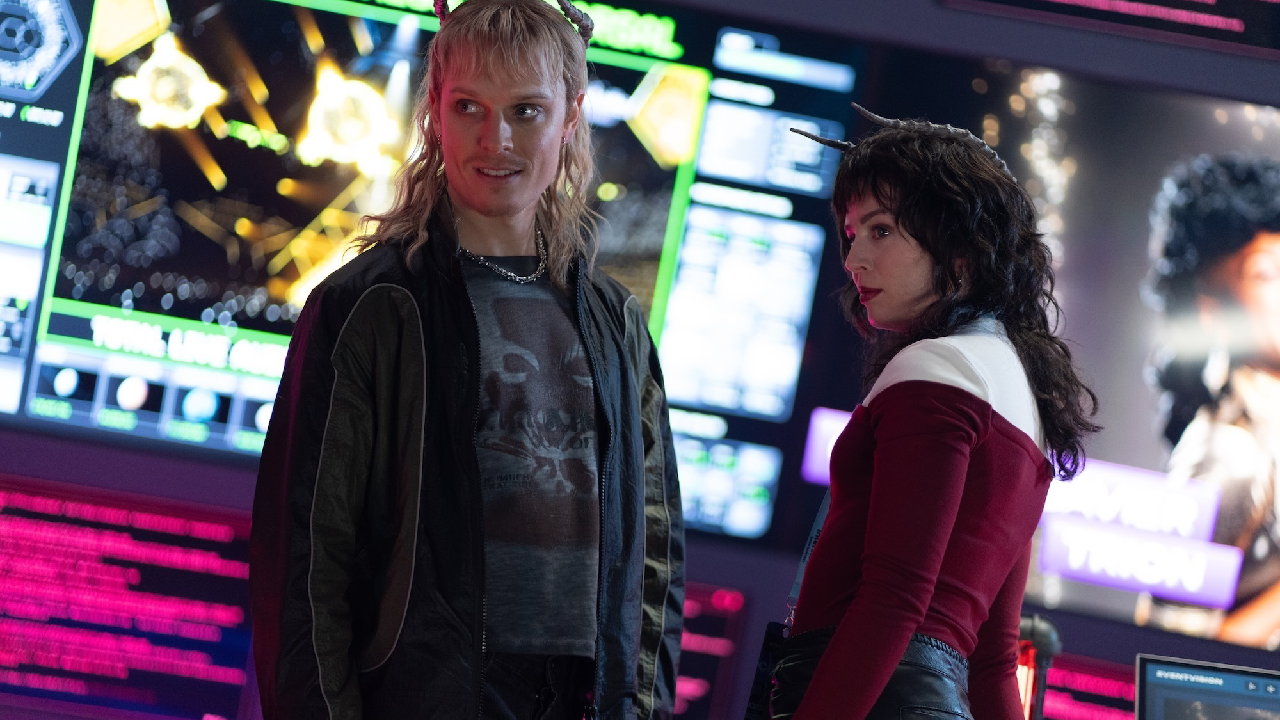Major spoilers ahead!
This week Doctor Who has another first, a bit of a tie-in episode to the Eurovision Song Contest, the finals for the 69th Eurovision airing in the UK immediately after this episode.
Last week’s episode broke new ground by taking The Doctor to Africa and including African folklore and culture in a great episode about the power of stories. This week takes the show back to an element it has come to be renowned for – a campy fun time.
Honestly, I don’t think you could expect anything less for an episode themed around Eurovision, but the episode does a fantastic job of balancing that with darker elements particularly surrounding The Doctor in this episode.
Welcome to the 803rd Interstellar Song Contest!
The episode starts with the Doctor and Belinda arriving in a space station to take the final reading needed on the Vindicator, the device the Doctor has been using to allow the TARDIS to land on Earth and return Belinda home.
It doesn’t take long for things to go wrong though. We get an introduction to the song contest through a cryogenically frozen Rylan Clark, a beloved television host in the UK, and though we get the start of the first song, it’s interrupted by a young couple who take over the station and vent the crowd into space.
It’s a huge juxtaposition of tone from the campy excitement of Eurovision, but it’s a juxtaposition that works throughout the episode and the balance strengthens both elements and prevents the show from being too silly to be taken seriously. In part, this is helped by the show treating the scene seriously too. It’s easy, particularly in a family show like this, to play a scene like this off with a healthy dose of humor but it’s not done here. Sure, there’s a little bit of humor with a one-liner from Clark to cap it off, but the scene itself is a strikingly dark and beautiful image as the crowd, Doctor and TARDIS included, are pulled out of the station and into space.

Our villain of the episode Kidd is a Hellion, a species persecuted throughout the galaxy due to their horns giving them a devil-like look and wide-spread misinformation about their world and culture driving widespread hatred and derision from other species. Kidd seeks revenge on The Corporation, who bought the planet and the people in order to use the planet’s native poppies as flavoring for their honey.
The episode invites a conversation about the role of corporations in the destruction of communities in order to access resources, The Corporation standing in for real life companies like Nestle who have faced a number of controversies over exploitation of several markets. It’s through one of the side characters that Kidd’s motivation is revealed to us. It’s a moving and compelling bit of back story for that character, but as it ties so heavily into the motivation of the villain of the narrative it effectively sidelines Kidd completely.
The conversation the episode prompts is a worthwhile one and the contrast between it and the Interstellar Song Contest as a continuation of the Eurovision Song Contests, which is often seen as having a mission of bringing people together. Ultimately, the themes of the episode far exceed the villain in terms of interest. Kidd ends up more as a vessel to trigger The Doctor’s trauma and bring out his worst than a compelling villain by himself, and is then further upstaged by reveals later in the episode.

Kidd intends to use the broadcast of the song contest to transmit a Delta Wave that will kill the three trillion life forms watching live. Eagle-eyed viewers may recognize the Delta Wave as the method by which Christopher Ecclestone’s 9th Doctor intended to kill a newly reborn Dalek Empire, and the human race with it, in his regeneration episode in 2005.
At this point, assuming Belinda to have perished when the crowd was vented into space, this Doctor is enraged by Kidd’s plan, culminating in a scene that allows Ncuti to absolutely shine, once again, in his performance as the Doctor. A vital aspect of the characterization of The Doctor, and something that has been missing up to his point in Ncuti’s performance is the fury of a Time Lord.
In The Doctor’s rage, he uses a hard-light hologram to inflict immense pain on Kidd, vowing to do so for each of the three trillion lifeforms Kidd planned to kill. I sense that in this scene we are supposed to pity Kidd, but the emotional tie the audience has to his story and background is tied to another side character and so it’s hard to see him as anything other than fodder for The Doctor to rage on, the realization from the Doctor that he had taken things too therefore far doesn’t really have the resonance it should.
The Doctor is only ever one heartbreak away from being an unstoppable villain in his own right, and Ncuti encapsulates this in a truly terrifying performance. Ncuti has put on an absolute masterclass this season knocking performance after performance out of the park.
Thankfully, there are solid performances all around, with side characters being both memorable, well-acted and actually contributing to the episode. It hadn’t really been so noticeable to me up until this episode that many of the side characters in Ncuti’s run have been quite passive in their role in the episode, but here, the Doctor utilizes the skills of pretty much all of the characters around him in order to enact a solution and save the day, rather than just being there to be saved.

One day, I shall come back…
With only the two-part finale left for the season, it was safe to say there was an expectation of some kind of twist or reveal in the episode — and it certainly didn’t disappoint. In fact, the reveals, yes reveals plural, were so big that not only do they naturally boost the quality of the episode but they also massively overshadow it too.
I went back and forth about how much detail this review should give away. I always try to avoid giving away too much of the episode and its twists but ultimately, this episode will never be separated from its two long-awaited, fan-favorite reveals.
It’s fairly early in the episode that we get the first. When The Doctor is blown into space along with the crowd of the song contest, he is saved from the brink of death by a vision that spurs him to find his way back to the station. A vision of his granddaughter, Susan. Susan’s return has been long awaited by fans of the show, with calls for her return not only since the beginning of the revived era of the show in 2005, but back in the classic era too. For the uninitiated, Susan Foreman was the show’s first-ever companion, traveling with William Hartnell’s 1st Doctor and two of her schoolteachers from the beginning of the show in 1963.
She is the template from which all future companions are in one way or another based on. The Doctor’s lauded goodbye speech to her in 1964’s The Dalek Invasion of Earth is to this day one of the show’s most memorable and most quoted speeches, but The Doctor’s infamous promise of “One day, I shall come back. Yes, I shall come back.” is one that has yet to be followed through on. Until now.
Last season’s finale included some pretty heavy teasing of Susan, prompting many to suspect her return was due, but whether this is to be resolved this season, or is perhaps merely set up for the next season remains to be seen. With another big return set for this season, my money is that this is probably the start of set up for the next season.
Bye, Bye, Bi-generation
It’s at the end of the episode that we get our second big reveal. The culmination of the episode sees the TARDIS breached by an explosion and a cut to credits. We almost immediately cut to a mid-credits scene that sees one final person rescued from being blown into space and revived, the mysterious Mrs. Flood who has been popping up in numerous cameos for the whole of the season. She reveals that her double brain stem had frozen while in space, damage unfortunately deadly… for a Time Lady, revealing herself to be long-awaited to return villain, The Rani.
We then get our second instance of bi-generation in the show. Another caveat for those unfamiliar with the show or new for this season, when a Time Lord or Lady dies, they have the ability to cheat death and regenerate into a new body. It’s the main mechanism for the show surviving 60 years and changing the lead actor 14 times. In the 60th anniversary, the walls between myth and legend, and reality were broken down causing the 14th Doctor to bi-generate, where instead of the new body regenerating into a new one, the new incarnation of the Time Lord splits from the old and the two continue on as separate entities.
I don’t like it. I didn’t like it when I heard the leaks that this was going to happen in the specials, but I ultimately felt it worked for the narrative and as a one off. I particularly didn’t like the suggestion by the show’s showrunner, that bi-generation retroactively happened to every Doctor in order to try and justify how they could have old Doctors return despite having aged, and I really didn’t like it here. It’s a ridiculous concept that just complicates the show unnecessarily.
With The Doctor’s bi-generation Doctor Who now encounters the same issue solo Marvel films encounter. Any episode set on modern day earth just begs the question, why doesn’t the other Doctor left over from the bi-generation come to help out? particularly when the last season finale involved a God of Death basically wiping out all life throughout all of space and time.
This is less of an issue for The Rani’s bi-generation, particularly as it adds an interesting twist to the dynamic between Mrs. Flood and the newly bi-generated Rani, with the former taking on a subservient role to the new incarnation, but bi-generation is still a big issue. One that I’m not sure how they’re going to fix if they continue to use it in place of regeneration.
The Rani will be an interesting villain for The Doctor to face in the upcoming final two episodes. Where the Doctor’s more common Time Lord foe, The Master, is the conqueror bent on bending the universe, and particularly Earth to his will, The Rani is the mad scientist setting traps and crafting plots, all in the aid of a bigger twisted scientific experiment. It’s a different kind of evil for the Doctor to face and an avenue for the show.

Nul points
The Interstellar Song Contest is, for the most part, a strong episode. It’s an episode that has a powerful message but is ultimately held back by forgettable villain and its premise as a tie-in to the Eurovision Song Contest that it could have done more with. While there are number of standout characters, performances and writing on display in this episode it is all inevitably swallowed up, for now at least, in the excitement of its two shocking reveals.
While there is a lot I really enjoyed about this episode, I think it really needed a stronger villain to really set itself apart and stand on its own two feet shrouded by less of the shadow of the return of a fan-favorite companion and villain. In the end, I think the episode is good. It could have been great, but it just needed to give me a little bit more from the villain.
The Review
GOOD









